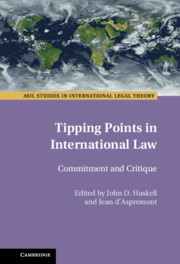Book contents
- Tipping Points in International Law
- ASIL Studies in International Legal Theory
- Tipping Points in International Law
- Copyright page
- Contents
- Contributors
- Acknowledgments
- 1 Experiencing Tipping Points in International Law
- 2 The Literary Performances of the Tipping Point
- 3 Authoritarianism
- 4 China
- 5 Democracy
- 6 Development
- 7 Digital
- 8 Environment
- 9 Health
- 10 Human Rights
- 11 Labor
- 12 Liberation
- 13 Multilateralism
- 14 Race
- 15 Religion
- 16 Rule of Law
- 17 Russia
- 18 Systems
- 19 Territory
- 20 United Nations
- 21 Universalism
- Index
10 - Human Rights
Published online by Cambridge University Press: 23 October 2021
- Tipping Points in International Law
- ASIL Studies in International Legal Theory
- Tipping Points in International Law
- Copyright page
- Contents
- Contributors
- Acknowledgments
- 1 Experiencing Tipping Points in International Law
- 2 The Literary Performances of the Tipping Point
- 3 Authoritarianism
- 4 China
- 5 Democracy
- 6 Development
- 7 Digital
- 8 Environment
- 9 Health
- 10 Human Rights
- 11 Labor
- 12 Liberation
- 13 Multilateralism
- 14 Race
- 15 Religion
- 16 Rule of Law
- 17 Russia
- 18 Systems
- 19 Territory
- 20 United Nations
- 21 Universalism
- Index
Summary
The original critique of human rights is well known. Throughout the 1980s and 1990s, scholars drew attention to various blind spots in the human rights project. Feminists demonstrated its failure in representing and protecting women, just as parallel limitations were targeted by queer and disabled activists, finding powerful institutional battlegrounds in the European Court of Human Rights and the United Nations. TWAIL and post-colonial scholars critiqued the colonial imagery of ‘victims, savages and saviors’ that underpinned the movement, and many critiques intersected multiple communities.
- Type
- Chapter
- Information
- Tipping Points in International LawCommitment and Critique, pp. 172 - 195Publisher: Cambridge University PressPrint publication year: 2021
- 1
- Cited by

